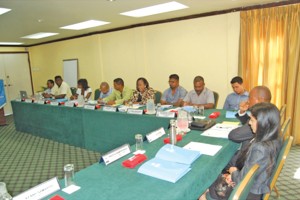
Key stakeholders have benefitted from a three-day workshop held last week at Cara Lodge in Georgetown titled “Innovative and Regulatory Incentives for Energy Efficiency and Renewable Energy Initiatives”.
The workshop was conducted by the United Nations Economic Commission for Latin America and the Caribbean (ECLAC), with support from the German Agency for International Cooperation (GIZ). With representatives from Curacao, Guyana, Grenada, St Lucia, St Vincent and the Grenadines and Trinidad and Tobago in attendance, the workshop was part of an overarching sustainable energy project in the Caribbean under the theme ‘Reducing the carbon footprint in the Caribbean through the promotion of energy efficiency and the use of renewable technologies’.
“The initiative was implemented in recognition of the central issue of energy and the need for renewed energy strategies in response to climate change,” said Williard Phillips, economic affairs officer of ECLAC sub-regional headquarters for the Caribbean and Trinidad and Tobago.
The workshop served as a spring board for the launching of a training manual which was developed to apprise stakeholders of the methodologies that may be employed in removing fiscal and regulatory barriers to implementation of energy efficiency measures and renewable energy technologies.
“The aim behind the creation of the training manual is to seek to complement national initiatives in raising awareness of the barriers as well as build the capacity of energy experts in techniques that may be used in the removal of said barriers, thereby prompting greater energy efficiency and increased use of renewable energy technologies…” said Facilitator Elizabeth Emanuel, ECLAC consultant and managing director, Jamaica Sustainability Managers, Jamaica.
Chief Executive Officer of the Guyana Energy Agency (GEA) Dr Mahender Sharma, in his remarks, thanked ECLAC for being a supportive partner of the energy sector and expressed the view that the “… workshop presented the opportunity to equip participants with the skill set to effectively tackle very difficult and challenging topics relating to energy issues not only within their respective countries but from a regional perspective as well…”
The training manual, which was piloted in Guyana prior to its launch, is the product of consultations with the Guyana Energy Agency, representatives of the private sector and other agencies (in Guyana), where barriers that impede the implementation of energy efficiency measures and renewable energy technologies were identified.
Key stakeholders have benefitted from a three-day workshop held last week at Cara Lodge in Georgetown titled “Innovative and Regulatory Incentives for Energy Efficiency and Renewable Energy Initiatives”.
The workshop was conducted by the United Nations Economic Commission for Latin America and the Caribbean (ECLAC), with support from the German Agency for International Cooperation (GIZ). With representatives from Curacao, Guyana, Grenada, St Lucia, St Vincent and the Grenadines and Trinidad and Tobago in attendance, the workshop was part of an overarching sustainable energy project in the Caribbean under the theme ‘Reducing the carbon footprint in the Caribbean through the promotion of energy efficiency and the use of renewable technologies’.
“The initiative was implemented in recognition of the central issue of energy and the need for renewed energy strategies in response to climate change,” said Williard Phillips, economic affairs officer of ECLAC sub-regional headquarters for the Caribbean and Trinidad and Tobago.
The workshop served as a spring board for the launching of a training manual which was developed to apprise stakeholders of the methodologies that may be employed in removing fiscal and regulatory barriers to implementation of energy efficiency measures and renewable energy technologies.
“The aim behind the creation of the training manual is to seek to complement national initiatives in raising awareness of the barriers as well as build the capacity of energy experts in techniques that may be used in the removal of said barriers, thereby prompting greater energy efficiency and increased use of renewable energy technologies…” said Facilitator Elizabeth Emanuel, ECLAC consultant and managing director, Jamaica Sustainability Managers, Jamaica.
Chief Executive Officer of the Guyana Energy Agency (GEA) Dr Mahender Sharma, in his remarks, thanked ECLAC for being a supportive partner of the energy sector and expressed the view that the “… workshop presented the opportunity to equip participants with the skill set to effectively tackle very difficult and challenging topics relating to energy issues not only within their respective countries but from a regional perspective as well…”
The training manual, which was piloted in Guyana prior to its launch, is the product of consultations with the Guyana Energy Agency, representatives of the private sector and other agencies (in Guyana), where barriers that impede the implementation of energy efficiency measures and renewable energy technologies were identified.



